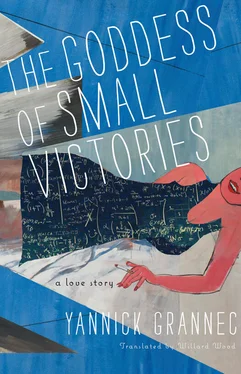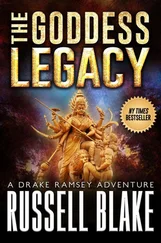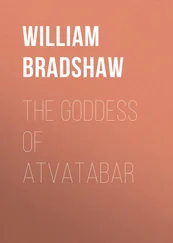“It’s a horror movie, Adele.”
“Even mummies have the right to be scared! You know, I could have met this fellow Kubrick if Kurt had ever stepped away from his blackboard for even a minute.”
Anna forgot about her watch.
“Mr. Kubrick was writing a screenplay about artificial intelligence, or space travel, I don’t remember exactly. Kurt never answered his letters, and Kubrick, who lived in London, refused to travel! The two of them were obviously never meant to meet.”
“Kurt Gödel in the credits for a science fiction film! I have a friend who would love that story. He’s obsessed with 2001: A Space Odyssey . I never managed to watch it all the way through.”
Adele squashed her cigarette end with the tip of her cane.
“As I understand it, you must have missed quite a number of end credits. And who is this friend you are talking about?”
34. DECEMBER 5, 1947: So Help Me God!
I hereby declare, on oath, that I absolutely and entirely renounce and abjure all allegiance and fidelity to any foreign prince, potentate, state, or sovereignty, of whom or which I have heretofore been a subject or citizen; that I will support and defend the Constitution and laws of the United States of America against all enemies, foreign and domestic … so help me God.
— From the Naturalization Oath of Allegiance to the United States of America
“Where are they? We’re late!”
“It’s less than a half hour to Trenton. You’re more nervous than you were before your thesis defense, Kurtele.”
“This is an important day. We mustn’t make a bad impression.”
A pale yellow automobile drove up the street and honked, drawing to a stop at our feet. Morgenstern was behind the wheel, and Albert’s bushy head emerged from the passenger side.
“How elegant you look, Adele! You are a credit to your new country.”
I turned in place to allow myself to be admired: a coat embroidered with chenille, kid gloves, and a black cap.
“You might have worn a tie, Herr Einstein.”
“Gödel, whatever J. Edgar Hoover may think, I have been an American citizen since 1940. I’ve earned the right to walk around wearing what I like. I intended to go in a bathrobe, but Oskar vetoed the plan.”
Kurt blanched in retrospective horror. Given his contempt for propriety, Albert could perfectly well have done it. Morgenstern invited us into his car. His tall, tweed-clad figure clashed with the bohemianism of his illustrious passenger. We sat in the backseat of the sedan. The trip had the slightly festive feel of a students’ outing. Only Kurt was tense. He had asked his two closest friends to stand in as character witnesses at the ceremony. Seven years after our arrival in the United States, we were applying for citizenship. A model student to the marrow, my husband had been preparing for the exam for months. Although Oskar had told him that the effort was unnecessary, he had applied himself to studying the history of the United States, the text of the Constitution, and local and state politics down to their tiniest details. He quizzed me every night at dinner, less concerned about whether I would pass than about my enthusiasm for the subject. I had even had to learn the names of the Indian tribes. Thanks to his pathological need for perfection, he had every answer down.
“So, Gödel, have you studied properly?”
Einstein was enjoying his younger colleague’s anxiety. After all these years, he still took pleasure in playing with Kurt’s nerves. Oskar, who had often had to pick up the pieces, was concerned to keep his friend in a good frame of mind.
“You know how thorough he is, Professor. Gödel could point out a thing or two to a doctor in Constitutional law. Which is not the point of the interview. The exam is a formality, not a thesis presentation. You do agree with me, don’t you?”
“I’ll answer any questions they put to me.”
“Right. Just the questions.”
“And if they ask me about it, Herr Einstein, I’ll have to tell the truth. I’ve found a flaw in the Constitution!”
I smiled at seeing both men stiffen.
“No, no, and no, Gödel!”
“It strikes me as pertinent! The American Constitution has procedural limits but no fundamental ones. Consequently, it could be used to reverse the Constitution itself.”
Albert turned in exasperation toward the backseat and barked at my husband’s obdurate face.
“By the hair on God’s chin, Gödel! No one in this car doubts the acuity of your logical thinking. But you do realize that criticizing the American Constitution to an American judge will make him less likely to grant you American citizenship!”
“Don’t get excited, Herr Einstein. Think of your heart.”
Albert drummed exasperatedly on the teak dashboard. He was avoiding smoking on account of his sensitive friend. Kurt was a rotten student in the logic of common sense. Furthermore, he hated being wrong, whatever the subject. I had made my choice: to be an irreproachable member of a community of sheep, you have to become a sheep yourself. At least for a few minutes. For his part, he refused to submit without a quibble to this humiliating exercise where he had to surrender his intelligence to the law, though he was completely unable to mobilize his talents for the public good. Unlike Albert, his rebellion never surfaced outside the realm of theory.
“You may be right. At least in appearance.”
“Be diplomatic! That’s all we ask of you. And for Christ’s sake, roll up that window.”
“The exam is dead simple, Gödel. They are going to ask you about the color of the American flag and things of that sort.”
“Ask him a difficult question, gentlemen! My husband loves to play games when he is sure of winning.”
Kurt closed his window and settled against the backrest.
“I’m waiting.”
“On what day do we celebrate Independence?”
“Harder. I’m not in kindergarten.”
“I know! On the Fourth of July. We celebrate our freedom from British subjugation.”
“One point for Adele. Who was the first president of the United States?”
Kurt listed the presidents in chronological order from George Washington to Harry Truman. He could have given the date they entered office and the length of their terms. Einstein cut him off before he launched on a detailed biography of each.
“Who will be our next president?”
My husband thought he had missed a fact. I jumped in, happy to lighten the mood.
“John Wayne!”
“An actor for president? What a strange idea, Adele!”
“Did you see They Were Expendable ? I adored that movie.”
“Let’s stay serious. You should ask my wife questions about how the government is organized. There are gaps in her knowledge of the legislature. Speaking of which—”
“Enough, Gödel. What are the thirteen original states, Adele?”
I recited my catechism, but with the slightest hesitation. Kurt leapt at the chance to prove how tenuous my knowledge was. This was a kind of fact I never stored in my memory for more than a few weeks. I didn’t like to burden myself with useless baggage. Kurt had been working at mental retention since he was a toddler. Fortunately, Albert came to my rescue.
“Adele, why did the pilgrims leave Europe?”
“Because of taxes?”
“Possibly. British cooking would have been enough to make me run away.”
“To practice their religion freely. You really have no respect for anything.”
“Don’t be such a Puritan, my friend. You’re not yet an American citizen.”
Albert questioned Kurt about the basic tenets of the Declaration of Independence. It was a piece of cake. He had learned the text by heart and explained the beauty of it to me. Then I was questioned about the basic rights guaranteed by the Constitution. Freedom of speech, freedom of religion, freedom of assembly — values that the black years in Vienna had made us forget. I had not made use of any of them since arriving in America, not even the most exotic freedom: the right to own a gun.
Читать дальше












